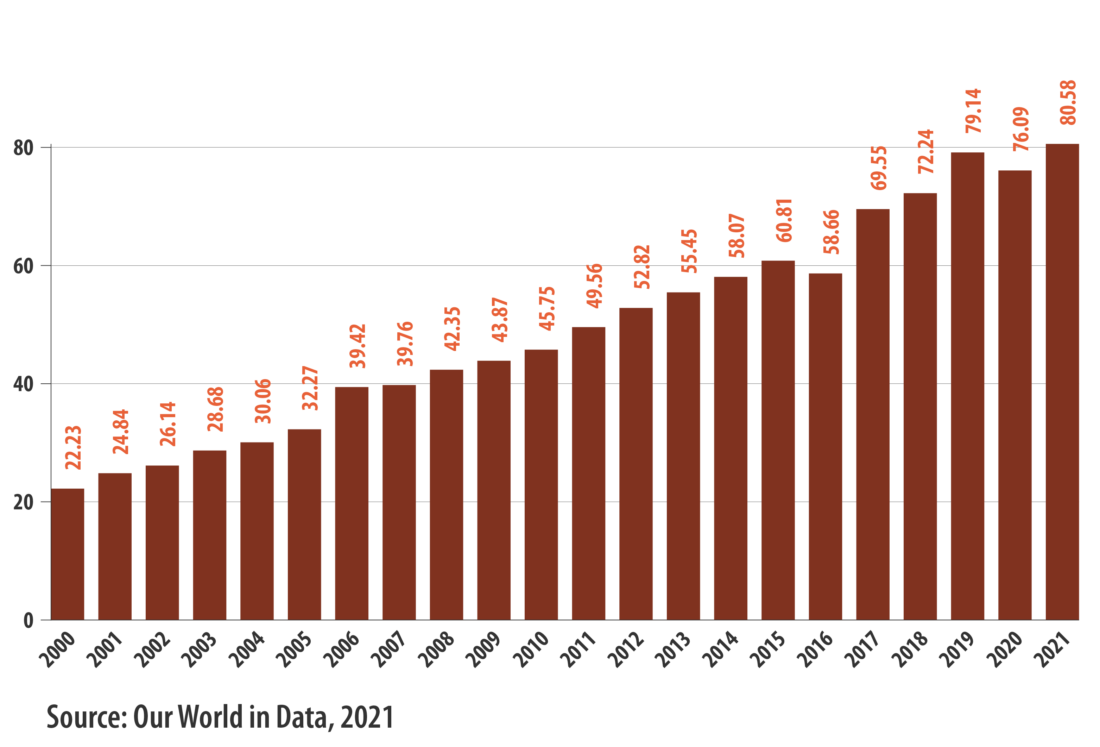
Palm oil
Palm oil has many advantages. This vegetable oil gives many foods the right texture and consistency. Its neutral taste, heat resistance and great versatility in foodstuff production make it an extremely attractive oil in the industry. Moreover, oil palms are a high-yield crop. They need less land than any other oilseed crops, are more resistant to disease than other crops and generate consistent yields for up to 30 years. That makes palm oil cheaper than other oils.
Efficiency of land use in vegetabel oil production 2021

The global palm oil boom
In the past 20 years, palm oil production has more than tripled. Indonesia and Malaysia account for 84% of worldwide production. Currently, palm oil is the most used vegetable oil in the world.

Worldwide Production of vegetabel oil seeds in Million Tons 2023

TV report: Palm oil harvesting and processing
Vital income
In many tropical countries, palm oil production has driven rural development. Globally, palm oil is an important source of income for more than 7 million people. Although the cultivation areas of smallholder farms are small compared to industrial plantations, in Malaysia and Indonesia alone, small-scale production accounts for about 40 % of the total palm oil cultivation area (RSPO).
«SECO works to promote the use of sustainability labels and standards in the production of agricultural raw materials. That is why it is also involved in the development of sustainable palm oil supply chains.»
Monica Rubiolo, Head Trade Promotion SECOThe problem
In the wake of the global palm oil boom, new plantations are being created not only in Indonesia and Malaysia but also in other tropical countries, such as Papua New Guinea, Colombia, Nigeria and Cote d’Ivoire. New palm oil plantations often replace valuable tropical rainforests, thus robbing many species of their habitats. Slash-and-burn agriculture and the draining of peat swamp forests are releasing large amounts of greenhouse gases such as carbon dioxide and methane. New plantations often also trigger conflicts over land use.
Sustainability
To limit the destruction of species-rich tropical forests, producers, financial institutions, civil society organisations, industry and trade founded the Roundtable on Sustainable Palm Oil (RSPO) in 2004.
Unfortunately, a large proportion of all palm oil worldwide is still not certified according to recognised sustainability standards. In 2023, only just over 16 million tonnes, i.e. 20% of global palm oil production, was certified according to a sustainability standard, of which around 10.6 million tonnes were certified according to the RSPO.
According to the latest impact report, the RSPO now has over 6,000 member organisations in more than 100 countries. The certified oil palm area covers 5.2 million hectares in 23 countries. As part of RSPO certification, an area 19 times the size of Kuala Lumpur, i.e. 466,609 hectares, has been preserved. RSPO credits worth USD 7.0 million directly benefited 85 certified independent smallholder groups in 2023, while 9 RSPO programmes were implemented to engage over 200 grassroots organisations in 7 countries. Since 2015, cumulative greenhouse gas emissions of 468,864 cars have been avoided – the equivalent of Cameroon’s car fleet.
RSPO shows impact
Alternatives
Switzerland’s palm oil imports have declined because manufacturers are partly switching to alternative oils derived from soybeans, coconut, sunflower or rapeseed. A transition from palm oil to other oils, however, does not solve the problem because the alternatives are hardly any better: coconut plantations would have to be created in the Philippines and Indonesia. Likewise, soy plantations would have to be created in South America. Moreover, to produce one litre of oil from sunflower or rapeseed, a much larger area is required for the cultivation these crops.
«If you take a look at the catastrophic effects of palm oil (...), you realise that there are no easy solutions. Half of the world's population uses palm oil in its food. If you ban or boycott it, it will simply be replaced by other oils. At the same time, however, you will need far more acreage to grow the crop.»
Inger Andersen, former Director General IUCN